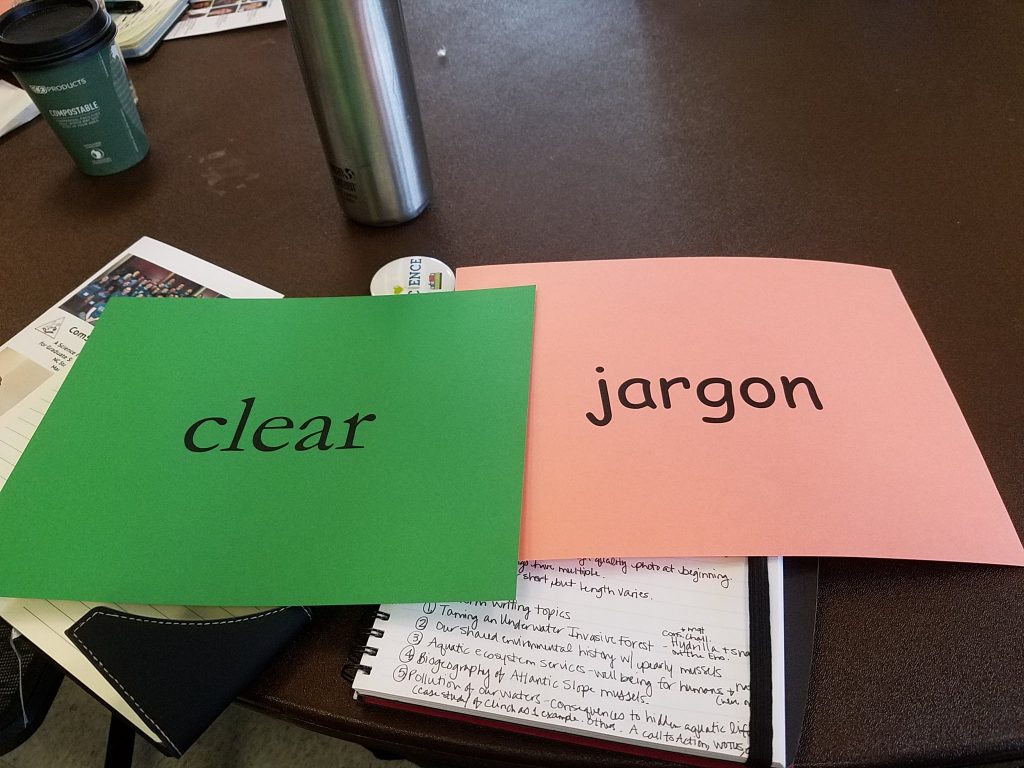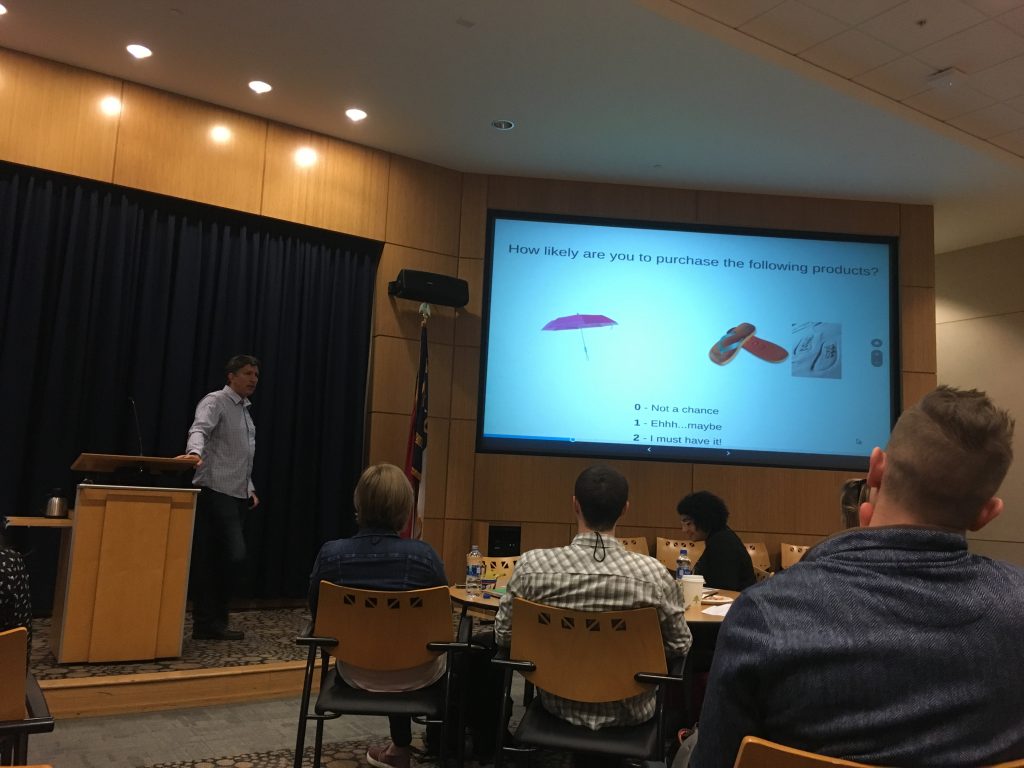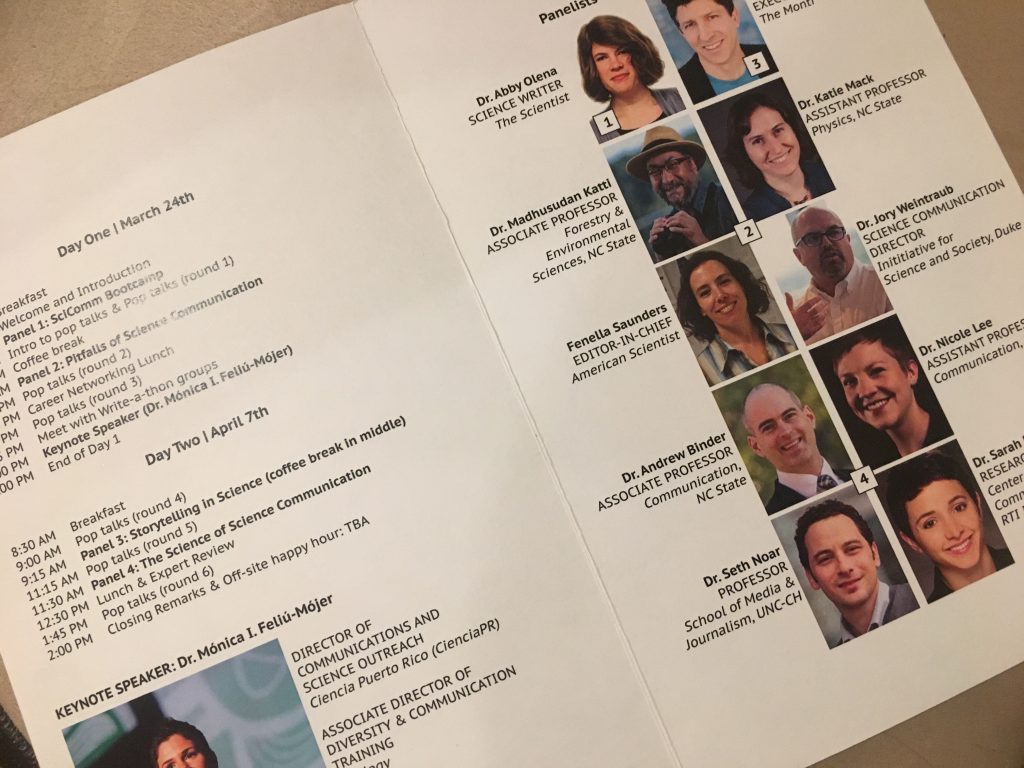Two weeks after our first day of ComSciCon Triangle (see blog post Part 1), participants and organizers reconvened in Raleigh for another fun (yes, fun!) day of lessons in science communication. My main take-away from this second and final day of the workshop was the importance of storytelling in science.

Our morning kicked off with a round of pop talks, during which participants described their research to everyone with a 1 minute time limit. Participants in the audience held up either green “Clear” cards or orange “Jargon” cards to give the presenters instant feedback on the accessibility of their words. The organizers were extremely supportive and encouraging, and made clear that we were in a non-judgmental environment and weren’t expected to practice our pop talks. My heart still started pounding faster later that afternoon when it was time for my own pop talk, but one minute went by pretty quickly.

After pop talks, speaker Jeff Polish gave a lesson in storytelling. If any of us were still tired or unengaged during morning pop talks, Jeff immediately infused us with energy and attracted our full attention. He introduced his workshop topic by telling a story of how he fell asleep in department seminar during graduate school, and his snoring drew attention from the whole audience. This hilarious and relatable tale had a message: there are too many boring seminars out there, which are costing people time and money. We can improve by telling stories.
Storytelling adds a few more dimensions to research presentations. Instead of just informing your audience, you’re also impacting and moving them when you tell a story. The audience must feel connected so they can feel compelled to care.

Stories have three key characteristics. They are engaging, evoking emotion from the audience. They are relatable, connecting to the audience’s lives. And they have impact, causing the audience to remember long after the presentation is over.
Stories also have a general structure. First, the beginning describes the problem and what’s at stake. This hooks the audience and provides context for the significance of your research. Next is the middle, when tension and interest are built. In science communication, this is most often where the results of a study are described. Finally, the end of the story summarizes the meaning and impact of your research, tying in the potential effects to your audience or society. In summary: beginning = why?, middle = what?, end = impact?
A participant raised the issue that I’m sure many of us were thinking: what if our research is too “far away” from a potential application to sell it to an audience? In this case, Jeff advised engaging the audience by talking about our personal motivation for our research, and reassured us that it’s okay to bring your full, authentic self to the stage. We could also describe our research as a single step in a long, chain-like process leading to an impact (which is pretty much always the case in science).
Next, we had a panel on the Science of Science Communication, where we learned from communication experts about how to connect with audiences and collaborate with our university’s media relations office.

Finally, one of my favorite aspects of the workshop was getting feedback on our own writing pieces. We met in small groups with an expert reviewer, and gave each other feedback on the articles we’d been writing since the first day of the workshop. Some people chose to write about their own research, and others wrote about broader topics in their field or about the culture of science and academia.
The expert reviewer assigned to my group was Laura Oleniacz, a former journalist for the Herald Sun and current science writer for the UNC Lineberger cancer center. Her main tips for us were to 1) tell the news first (i.e., put the main message of your piece right at the beginning) and to 2) keep it short. I also learned more quirks about Associated Press styling and citing, and the importance of getting quotes from characters in your story.
We now have the option of trying to publish our articles in a media outlet with the help of ComSciCon, which I am definitely going to pursue. ComSciCon has given me lessons, career advice, writing feedback, and the chance to connect with other graduate students and professionals. I’m extraordinarily grateful for the experience and thankful for the organizing committee, and highly recommend it to other graduate students.

